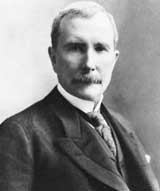"I was early taught to work as well as play,
My life has been one long, happy holiday;
Full of work and full of play-
I dropped the worry on the way-
And God was good to me everyday."

The poem above was how John D. Rockefeller would sum up his own life when he was 86 years old. He could not have been more precise and more succinct. Especially with that last line. See, Rockefeller was a paradigmatic Weberian capitalist: extremely frugal in his private life, merciless in business and convinced that he was following a divine plan. "My money was given to me by God", he would say.
The normal people never got to know this man -- Standard Oil's patron, the man behind the first great oil tanker, the author of a field economic treaty which would define how different monopolies could co-exist.
Like all of his colleagues, Rockefeller claimed he was the richest man in the world. He lived for almost a century (he was born in 1839 and died in 1937) and even now, so many years later, his still casts a shadow over New York. In fact, the character of Montgomery Burns, the ruthless magnate from The Simpsons, is largely based on him.
He was born in the state of New York to a traveling salesman who sold fake medicines for cancer. His mother was a strict, deeply religious homemaker. The boy had a tremendous capacity for calculus and would never, ever lose his temper. In fact, he organized his whole life like a grandiose, efficient and humanly sterile chess game.
He started out as a buck transporter, then he started bookkeeping. He made his first serious money as a young boy thanks to the wholesale foodstuff market and invested in petroleum in 1862. Just a three years before that, a man called Edwin Drake had come up with the idea of extracting the oil from the surface, instead of waiting for it to pop out on its own.
Here, Rockefeller invented the refinery business and established an interesting principle: when the oil gets cheaper and the transformation margins lessened, the smaller companies went bankrupt. The market itself induces to monopolies. That's why his conclusions were: never be a small company and always negotiate the prices with whatever competition you have.
Things haven't really changed in over a century and a half.